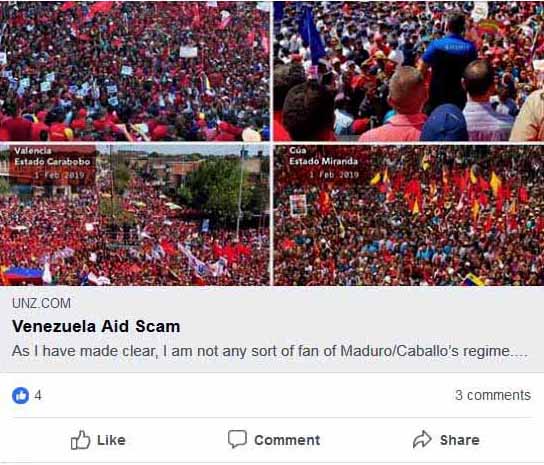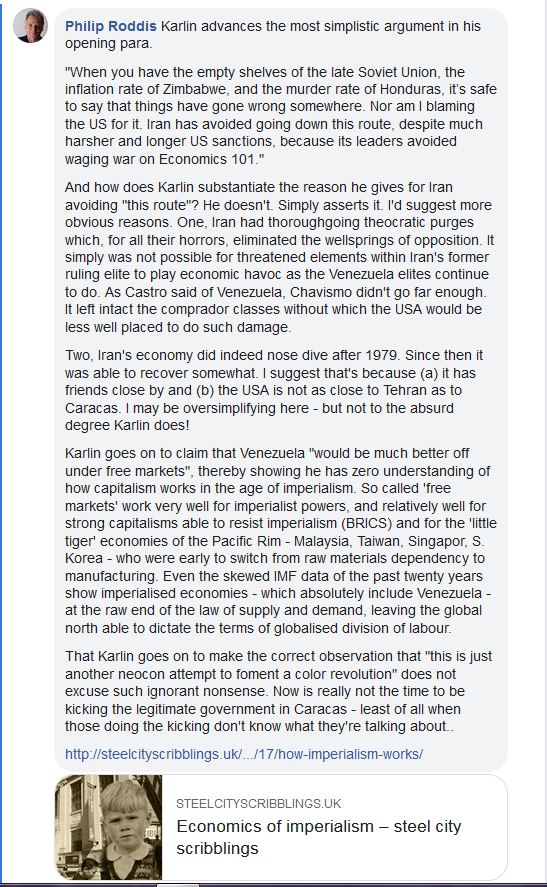Even some who oppose America’s blatant oil grab – I use the term as shorthand for a longer list of predatory motives for this latest ‘humanitarian intervention’ – are writing drivel on Maduro’s “failure”. The image below links to a piece today by Anatoly Karlin. Below it is my response.
With such friends, who needs enemies?
24
Feb



Hi Philip,
I can’t stand Karlin, he is a snarky, bought and paid for capitalist toad in the pay of Washington. As for his comment about “Free” markets. The free market system is not free, it’s rigged then abused under corporate grabs and there is a price to pay and it’s the working class who pay it.
You have the patience to be polite about utter shits like Anatoly Karlin, I don’t, so it’s just as well it’s you writing a credible rebuttal to Karlins specious propaganda.
Susan, when I posted my FB comment as above to Anatoly Karlin’s own site, he replied:
You are correct that Venezuela left its elites intact; Chavez-Maduro are extremely nice and fluffy, by the standards of 20th century Communist dictatorships.
I made that point in my last post on Venezuela: http://www.unz.com/akarlin/venezuela/
I would say that Iran was much more isolated. Who, exactly, were its friends? I can’t think of any in the 1980s; since then, it has acquired China and Russia, but they are *extremely* fair weather ones, who constantly stab it in the back. In contrast, until very recently, Venezuela had plenty of more moderate leftist sympathizing governments throughout Latin America, including Brazil.
I don’t buy any of your premises about imperialist economics, etc. Instead of torturously fitting differential national outcomes into the particularities of imperialism, exploitation, etc. that supposedly acted them, I find a human capital based theory of economic development to be much more succinct and plausible. Here is a summary: http://www.unz.com/akarlin/stupid-people/“
I responded:
Anatoly
I suspect we’re too far apart on some of these matters so will make three brief points in reply.
One, on the main issue of the hour – the predatory nature of this latest Washington/Wall St “humanitarian intervention” – we are entirely in agreement.
Two, a couple of points on the specifics of your Iran comparison. The Iranian economy – in 1979 Asia’s second largest but, like Venezuela’s, dangerous[ly] oil dependent – is in lousy shape. This past six months oil output has fallen from 2.5 million barrels to less than 1 Similar plunges have been in the steel and auto sectors. More important though is the fact that the theocrats’ ruthless liquidation of enemies within makes the comparison with Chavism meaningless.
Three, I realise of course that you “don’t buy” my understanding of the way the world works. But you throw out the unsubstantiated suggestion that I am “torturously fitting differential national outcomes into the particularities of imperialism, exploitation, etc. that supposedly acted them”. I actually linked to my review of a book, Imperialism in the twenty-first century, whose approach is decidedly bottom up and empirically based. It draws on vast amounts of data not hitherto accessible to show that imperialised economies can not escape the trap of shifting to manufacturing entirely on terms set by the global north. You are of course entitled to find fault with either that data – largely the product of IMF and WTO compiliations – or the analysis of it, but first you need to engage with it.
That’s it for me. I’m back to doing what tiny bit I can to promote awareness of the shafting we both agree is threatening the Venezuelan people. Thanks for engaging with me.
And that’s where it stands. I’ll engage further if AK comes back with specific points, but kicking the can back and forth at this level of generality is not fruitful. Sometimes we just have to walk away.